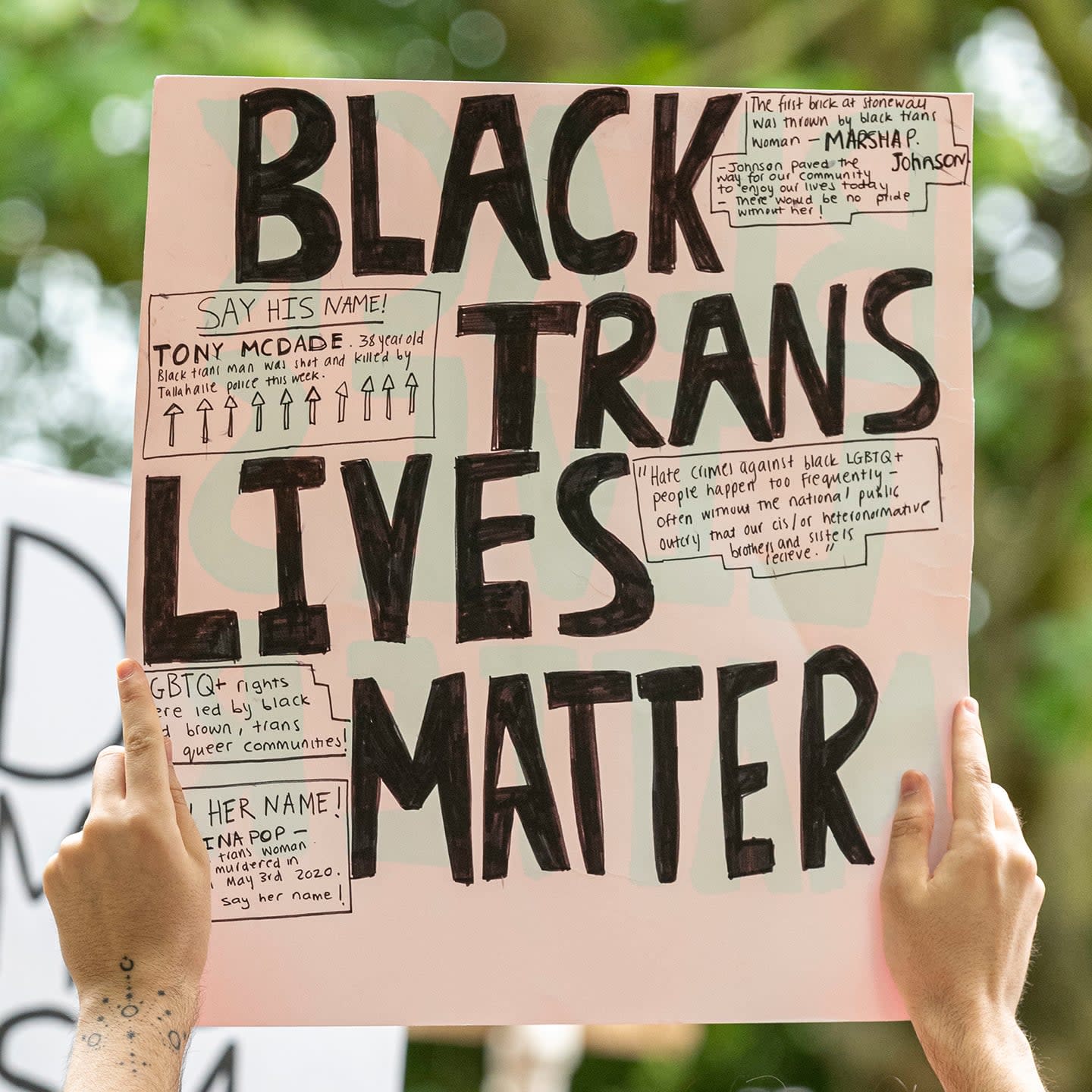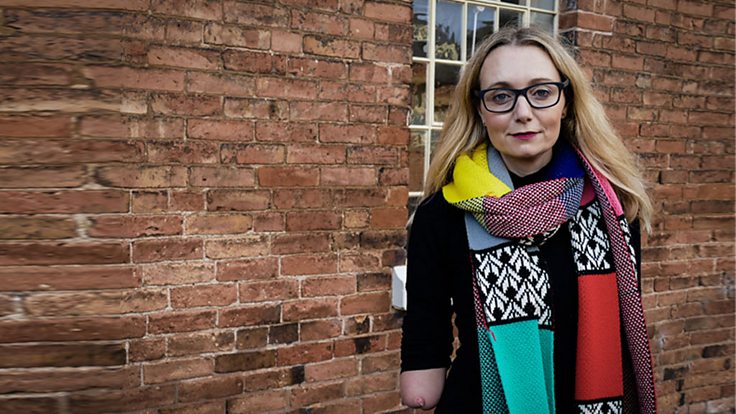January 2023
Abolition for Liberation
Abolition video edited – MediaSpace – City, University of London
The Centre for Law & Social Change hosted a roundtable on Abolition for Liberation with speakers Lola Olufemi (organiser, researcher and author of Feminism, Interrupted: Disrupting Power and Experiments in Imagining Otherwise), Scott Branson (artist, podcast host and author of Practical Anarchism: A Guide for Daily life and Surviving the Future: Abolitionist Queer Strategies) and Reed Puc (currently writing their PhD thesis at City on Spiderman, policing and abolition). The conversation was chaired by Natasha Mutch-Vidal of the Centre for Institutional Equity and the Network for Racial Justice. This event formed part of the Centre for Law & Social Change event series and City’s LGBTQI History Month events.
November 2021
Diversify your Mind Club
Trans Lives: Disclosure with Melz Owusu and Tabby Lamb
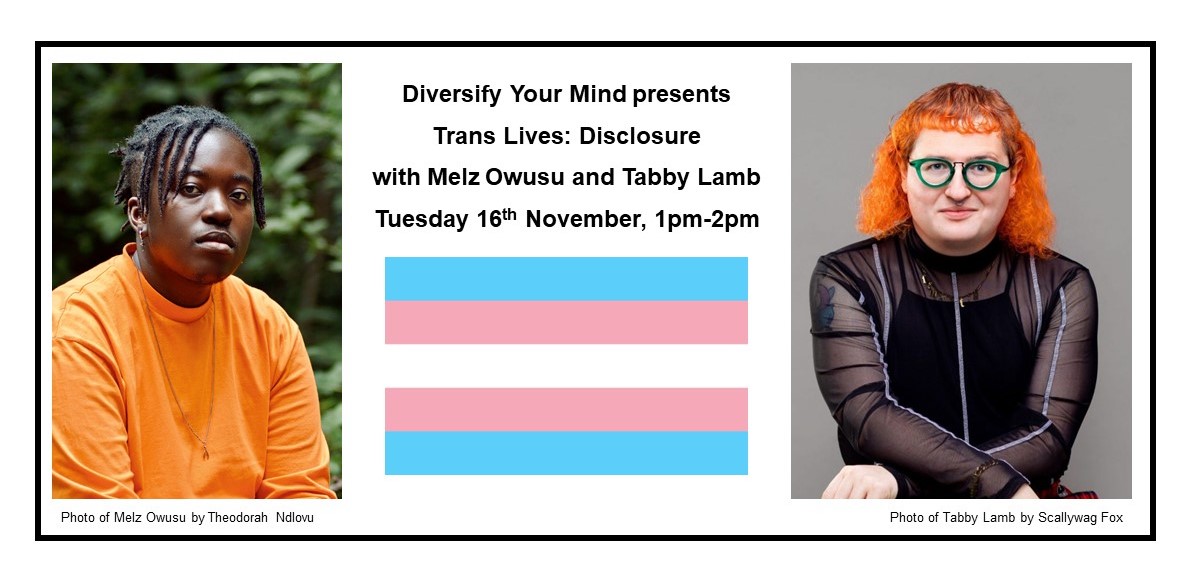

To mark Trans Awareness Week (13 – 19 November), the Diversify Your Mind club will be meeting online to discuss documentary film Disclosure and hear from two leading trans activists.
Melz Owusu (they/them) is the founder of the Free Black University and a leader in decolonising education. Their practice is informed by their lived experience as a Black queer transgender neurodiverse working-class individual deeply connected to community. Their passion is research, and they are currently undertaking a PhD exploring visions for collective liberation.
Tabby Lamb (they/she) is a non-binary writer and performer based in East London. She strives to tell stories that explore the intersections between popular culture and politics. Their debut solo show ‘SINCE U BEEN GONE’ premiered at the Edinburgh Fringe Festival 2019 and garnered a glowing 4* write up from the Guardian who called the play “bold, honest and swollen with love”.
Please watch Disclosure on Netflix before the event if you can. This documentary features trans actors and creatives discussing the portrayal of trans people in Hollywood films and TV.
In this session we’ll:
- explore how the misrepresentation of trans people in the media has real world impacts
- understand the realities of being a trans person in the UK today, including the intersections of racism and transphobia
- discuss what role we can all play to share our privilege and knowledge to further trans inclusion
Register here for this online event
This session is open to all City Staff. You can join the Diversify Your Mind Teams site here.
The session will be online on Microsoft Teams with auto-captions enabled. If you have any access needs, please email rec@city.ac.uk We will do our best to accommodate these.
October 2021
10th October 2021
Radical Self Care and Community Interventions
Our October Diversify Your Mind event marked World Mental Health Day (Sunday 10th October) and the start of Black History Month in the UK by exploring what radical self-care means, and its roots in Black feminism. We also looked at radical self-care acts in practice through community interventions such as Free Black University; a project with the vision to encourage the development of radical, imaginative, and transformative knowledge that can truly change the world, and create a space where the healing and wellbeing of Black folk lies at the heart of the educational experience’.
The EDI team were joined by Oge Obioha, co-founder of ‘Minds of POC’, a consultancy and training service aiming to improve support for people of colour in a multifaceted way, addressing the societal injustices people of colour face such as racism, sexism and homophobia.
About the session:
As attendees first joined the event, we shared our initial thoughts on what self-care meant to us. Answers ranged from doing things that make us happy, taking time to reflect and rest, and acts of physical, spiritual and psychological care that enable us to have the capacity to support ourselves and others.
We then used the AFROPUNK video on radical self-care to lead us into the session, where Alicia Garza shared her thoughts on misconceptions of self-care; namely that self-care is misconceived to be something only achieved through financial means typically afforded to white people. Alicia goes on to suggest self-care is a radical act of “putting yourself in front in a world that doesn’t encourage us to be alive, stay alive, take care of ourselves”.
Oge led us in a powerful conversation on where state support is missing, especially for Black women in our communities. It was deeply moving and motivating to hear about the students and activists of Free Black University striving to create a radical, anti-colonial and queer space where higher education can be reimagined.
What we learnt:
In breakout rooms, attendees discussed the following questions which I encourage you all to consider:
- Why is ‘radical self-care’ radical?
- How can we extend radical self-care across City?
- What can City learn from the work of the Free Black University?
We learnt that for a lot of us, ‘radical self-care’ is a new concept that we needed to explore further, and that for some, our privilege in being able to enact in self-care made is blind to how our Black colleagues could not do the same for fear of repercussion or reprimand. It is clear that the wisdom and knowledge shared at the event sparked reflection and thought for the attendees, identifying some things we can do as individuals and as a University to extend radical self-care. It was also important to note that relationships with race differ, and therefore support differs – but we do not need to have the answers all the time, and we should focus on a shift to creating safe spaces for conversations instead of instructions. We can all start by having more conversations like these to raise wider awareness, and recommend the following additional resources as starting points for discussion:
Reading Recommendations:
- A Burst of Light: Living with Cancer, essay by Audre Lorde in A Burst of Light and other essays. Available to read on City Library online
- Living While Black: The Essential guide to overcoming racial trauma, by Guilaine Kinouani
- ‘Self-care’: how a radical feminist idea was stripped of politics for the mass market | André Spicer | The Guardian
- Reclaiming Audre Lorde’s Radical Self-Care (refinery29.com)
Audio Recommendations:
Real Talk Webinar – 14th October 2021
White Leadership and Allyship – Performative vs Co-conspirator: Challenges for White allies and PoC at City and what changes are needed at City
This is the first of our Real Talk@City webinar series of important culture change conversations hosted by the EDI team at City as part of our race equality charter, racial equity, anti-racist education and inclusion creation work.
Learning intentions:
- Understand what allyship is through the lens of White leadership’s impact (negative and positive) when they are performative. Learn about the difference between performative actions and authentic allyship to help move colleagues from performative allyship to being co-conspirators of change.
- Explore how White staff can share privilege, space and access while being co-conspirators in anti-racism and equity creation work across City.
- Understand what being anti-racist means and how white staff’s role in being anti-racist will lead to a more inclusive City community for everyone.
In this webinar, we will be discussing the role White staff must play to progress anti-racist and equity creation work at City, including the importance of self-education, spotting and combatting barriers and making meaningful change as a co-conspirator with and for minoritised and racialised groups.
The session will start with a brief overview of key concepts followed by a panel discussion and Q&A session with City staff who occupy key roles across City.
All staff are welcome to this brave space learning event. Please contact any member of EDI Race Equality team if you have questions on rec@city.ac.uk. This event will be on Teams with auto captions enabled.
Panellists include:
Dom Davis – Senior Lecturer in English (SASS), Co-lead of the Student Attainment Group, member of RECSAT (Race Equality Charter Self Assessment Team)
Michelle-Louise Yembra – Senior Student EDI Officer, NRJ Events and Comms Co-Lead, member of RECSAT (Race Equality Charter Self Assessment Team)
Ruth Windscheffel – Senior Lecturer Educational Development LEaD, member of RECSAT (Race Equality Charter Self Assessment Team) and lead of its Teaching and Learning subgroup.
Deborah Rafalin – Associate Professor Department of Psychology (SASS)
Malla Pratt – Research Operations Manager Co-Director for Racial Equity and Inclusion Bayes Business School, Bayes Business School rep and member of RECSAT (Race Equality Charter Self-Assessment Team)
The Session will be opened by Emma Taylor-Steeds, EDI Manager at City, further supported by EDI team members, Joey Knocks (EDI Officer), Michael Jannetta (Senior EDI Officer) and Sabah Holmes (Race Equality Manager) through presentations of key concepts. This will be followed by a Q&A with panel members hosted by Natasha Mutch-Vidal (Senior EDI Officer (Race Equality)) and Tom Glynn (Senior EDI Officer (Charters and Data)).
This event is supported and sponsored by Jessica Jones Nielsen (AVP EDI – Race Equality and RECSAT Co-Chair) and Phil Gilks (CEO SU and RECSAT Co-Chair) as it is part of City’s Race Equality Charter work and helping City conduct honest self-interrogation and develop more confidence in talking about racial equity, inclusion creation, how to embrace diversity, understand and implement anti-racist thinking, mindsets and practice.
Reading Recommendations:
Here are some start-up reading suggestions to assist self-education and self-learning about what it means to move from being an ally to being an accomplice and co-conspirator* in the creation for race equity and inclusion:
- https://ready.web.unc.edu/section-1-foundations/module-13-allies-antiracism/ (has some useful reading links if you scroll down past the module description)
- https://medium.com/@knit0371/making-the-transition-from-ally-to-co-conspirator-cc28a5752af7 (great article that explains the difference and what it means to be a co-conspirator in the race, inclusion, allyship space – why being an ally is not enough)
- https://blog.improvedge.com/what-it-means-to-be-a-co-conspirator-next-level-allyship-in-2020 (a nice opinion piece with 3 steps co-conspirators can take – useful for discussion in a wider group)
- https://researchguides.library.tufts.edu/AntiRacismResourceGuide/WhyCoConspirators – anti-racism resource guide for some great resources all round.
- https://hbr.org/2020/11/be-a-better-ally – another great article to understand why co-conspirators are constantly acting strategically to effect change and they take ownership for it without PoC continuing to do all the work and bear the burden of labour and trauma that race equity change work creates)
- https://www.marine-ed.org/news/dei-dispatch-column-are-you-an-ally-or-a-co-conspirator(a great article including reflections from people – valid even though from a different sector and useful learning as the same questions/ reflections will arise in other white folk and a good explanation/ discussion of ally vs co-conspirator – with a good definition of co-conspirator),
“To be a white co-conspirator means to deliberately acknowledge that people of color are criminalized for dismantling white supremacy. It means we choose to take on the consequences of participating in a criminalized act, and we choose to support and center people of color in the justice movement”
~Violet Rush, Owning the Role of White Co-Conspirator
*NOTE/ opinion:
This is evolving terminology, with indicative definition and it can look different in action in different sectors/ institutions but at its heart – it remains as described by Violet Rush – co-conspirators effect change and recognise the hard truths. This is evolving social conceptualisation as we proceed on the journey towards creating racial equity – in the world and not just at City.
This is an American concept but the US in many ways is far ahead of the UK in race and inclusion work and more willing to challenge for change, while innovating and having more open and challenging conversations. We should be cross-learning cross-adopting and cross-implementing to create equity, racial or otherwise. The concept of co-conspirator also applies intersectionally so it is important to understand the concept and the fluidity of how it can be applied in action subject to the context of the issue faced.
Hence, the need for this webinar, City voices discussing what this means for us – are we even ready to be co-conspirators as white folk and existing allies at City, what do we need to do differently, are allies – self-selected and performative, are true co-conspirators and allies who are becoming co-conspirators in positions of power and authority to influence for change or are our leaders today still very much the selective, self-defined allies who are oblivious to what that journey from ally to co-conspirator looks like and why they should be aiming to be a co-conspirator from the start? accomplice is also a word interchangeably used by some for conspirator or co-conspirator.
September 2021
Diversify your Mind Club presents:
Bun Babylon
Tuesday 21st September 1 pm – 2 pm on MS Teams
Join us to ‘Bun Babylon!’
To attend, click here for the calendar invite
Why ‘Bun Babylon’?
To bun something is to convey displeasure or annoyance with someone or something.
To write something off or to disregard.
Examples:
Do you want to head to the pool? “Bun the pool”
What do you think of Matt? “Bun Matt”
by BunMattWraight April 19, 2019
The state, the system, particularly when corrupt or authoritarian. Also the police, as they are the agents of the threat of force that the state derives it’s power from.
It symbolized a protest against the oppression from Babylon, which had made its use illegal.
About the event
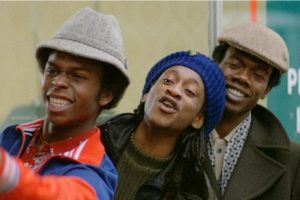
You are invited to our next DYM event looking at police brutality and the experiences of Black youth and sound system culture in the movie Babylon.
Directed by Franco Rosso, Babylon was released in 1980 and is set predominantly in South London. It presents a portrait of the young black community in London different from the tabloid stereotype. They are ordinary young black guys at the sharp end of inner city survival with dreams and fears of ordinary young people in general. Except of course that just like the sub-let garage where they house their equipment and play their tunes, their lives are hemmed in by the predictability of poverty, disillusion and the randomness of violence that can erupt at any time.
You can watch the film on Netflix, BFI Player or rent it on Amazon Prime. You can stream the soundtrack on Spotify.
Along with watching the film please read this article on Babylon: Film Night Reflections for more information and context about the movie in preparation for the event. During the event we will consider some questions and these will be posted below shortly for you to consider in advance.
July 2021
The hidden and invisible stories of disabled lives
Our July Diversify Your Mind event was held as part of Develop@City week which ran from 12th to 16th July 2021. Develop@City week gives staff a chance to develop and hone their skills, manage their wellbeing and connect with colleagues across a range of sessions. The week was a great opportunity for staff to attend a wide variety of sessions ahead of the new academic year, covering hybrid working, managing others, wellbeing, personal development, inclusive thinking and more!
The EDI team presented a diverse panel of City staff who shared their personal experiences around visible and invisible disabilities and how these experiences impacted them in their personal and work lives. Talks were followed by the panel answering attendee questions and having group discussions.
About the session:
Many of us don’t talk about the shared, often hidden and invisible experiences of disability that we all may experience through our different and intersecting identities. In our session, we presented attendees with a starting point to think about and consider how disability, the social (and cultural) model, might be a part of their individual lives at work and in the community.
We used the BBC documentary, Silenced: The Hidden Story of Disabled Britain to inspire and lead discussions, and hear from colleagues who shared their own research and disabled lived experiences. We then engaged in a reflective learning session as a group to share thoughts on disabled experiences that exist today and discuss what each of us could do in our roles at City.
The session received a lot of positive feedback from over 30 attendees, with one participant stating:
“…this was a session and space that I didn’t know I needed but actually really needed.”
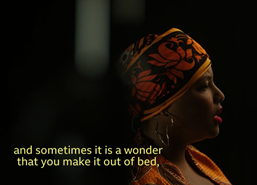 Watch the documentary here and check out the video clips we discussed here:
Watch the documentary here and check out the video clips we discussed here:
What does it mean to be young and disabled in today’s world? (Played and discussed in session)
As a disabled person, it is revolutionary just to exist
May 2021
WeRNotVirus
14th May 2021, 13:00-14:00 via Zoom
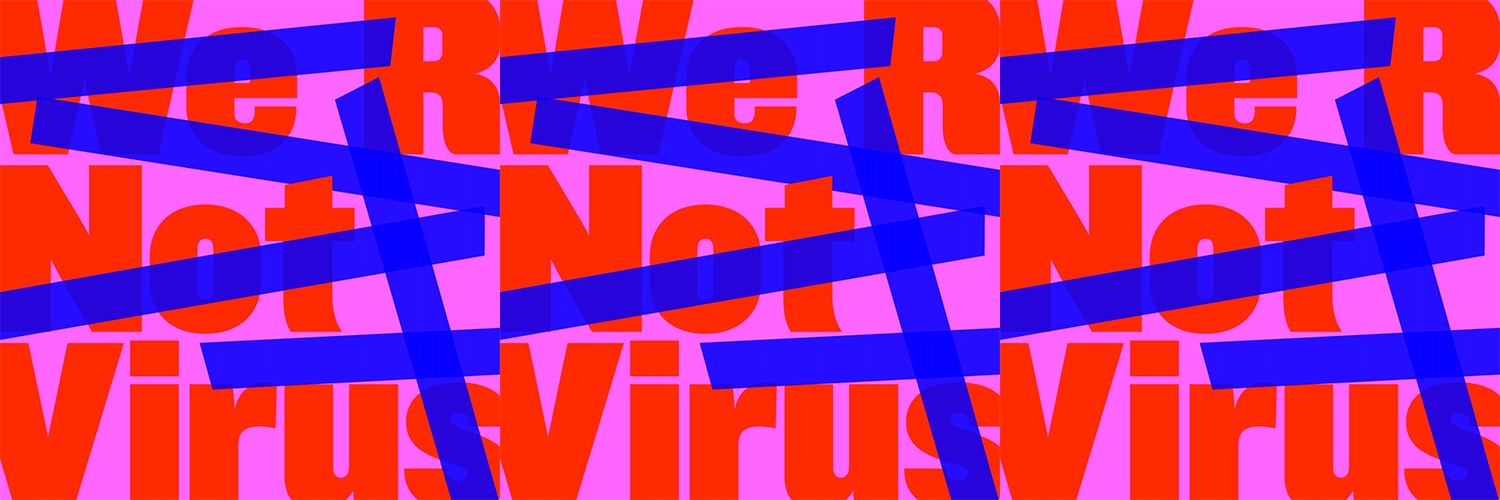
Since the emergence of the Covid-19 crisis there has been a tripling in reported anti-Asian hate crime. From January 2020 to March 2020 attacks on East Asians and South East Asians have risen 21% with over 260 crimes reported to the UK Police to the Home Office, compared with 360 for the whole of 2018 and 375 in 2019. However, as we know, racism is much more than individual acts, we are all responsible for self-education to deconstruct the colonial ideas and colonial influence that oppresses Asian people.
In response to this, Moongate has curated a collective of leading actors, writers, directors and creatives of East and South East Asian heritage from the UK’s performing arts industry joined forces online to present a new digital arts event titled WeRNotVirus. This urgent artistic response aimed to shine a light on the surge in hate crime directed towards the community during the Covid-19 crisis.
Pre-work we did:
- Watched some performances from the WeRNotVirus show. These performances were spread across Saturday and Sunday showings with different links at specific times:
- Saturday performance link: Recommended a watch from 37:49- 47:18 to see The Air We Breathe by Shaofan Wilson, performed by Emma Lau. Recommended a watch from 1:00:00-1:05:29 to see the performance of I AM NOT A VIRUS by Lucy Sheen and a community cast.
- Sunday Performance link: Recommended a watch from 02:12-12:38 to see Conundrums by Amber Hsu Performed by Camille Mallet de Chauney. Recommended a watch from 12:38-25:08 to see the performance of It’s Not A Game To Someone by Nemo Martin, Performed by Kirsty Rider
2. Read Covid-19, Anti- Asian Racial Violence and the Borders of Chineseness
by Dr Diana Yeh.
What we learnt: We used the pre-work to lead our discussions and learnt more about the exclusionary experiences endured by the East Asian and South East Asian Community. We were also be joined by senior lecturer Dr. Diana Yeh from City University who spoke about her work within the community and as an Academic.
You are encouraged to watch the whole WeRNotVirus show if you have the time! Please note the performances do feature derogatory language. If you have any concerns please email rec@city.ac.uk
March 2021
Queer Resistance in 70s Black Britain
Pre-work: We watched Young Soul Rebels, available on BFI player free on 14 day trial. Please note that this film does contain derogatory language and intimate scenes reflected in its 18 certificate. If you have any concerns please drop us an email on rec@city.ac.uk
What did we learn? At this event, we explored the Queer Black experience in 1970s Britain guided by the movie Young Soul Rebels. We were also joined by PhD researcher and historian Sue Lemos to support our discussions. Young Soul Rebels centres the experience of British LGBTQ+ People of colour, a narrative rarely explored within British history. We learnt about the multiple dangers faced by young black queer youth, both at the hands of corrupt police, people within their local community and even those that disguise themselves as friends. Holding intersecting marginalised identities, we saw characters deal with constant closeness to death but surviving through using joy as a form of resistance. You can view a Bibliography for the event here Queer Black History Bibliography where you can further your own learning.
Sue Lemos is a Black Queer Feminist PhD student at the University of Warwick researching queer Black political activism in Britain. Most recently, she completed an MA in Social Science Research (specialising in Economic and Social History) with a dissertation entitled ‘“For ourselves, by ourselves”: Historicising “queer Black and Brown” solidarity in the Black Lesbian and Gay Centre (project), 1985-1995’. Outside of her studies, she co-convenes the departmental Black Studies Reading Group and volunteers for the Haringey Vanguard, a community heritage project on BAME LGBTQ+ history in Haringey, North London from the 1970s to the 1990s.
October 2020
Absent Black Bodies in British Memoryscape: in celebration of Black History Month with Professor Olivette Otele
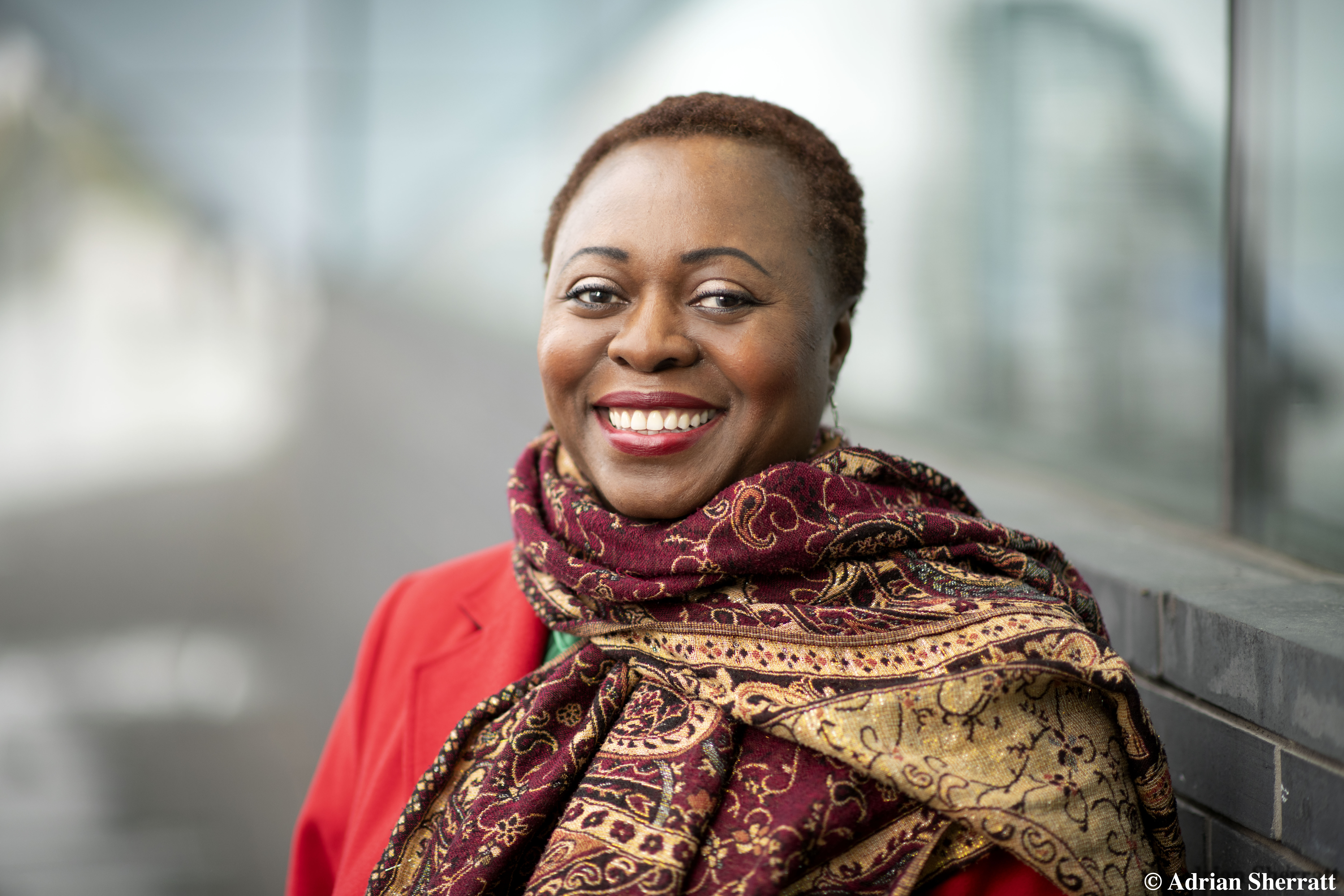
We were honoured to welcome Professor Olivette Otele, who became the UK’s first female Black history professor in 2018. Professor Otele’s talk focused on the way the Global North is currently looking at mass protest, racism and colonial violence seem to have shifted since the killing of African American George Floyd in May 2020. Yet, in Britain, debates about the legacies of the country’s colonial past that include memorialisation, discrimination and representation, seem to slowly descend into a disconnect between the histories of white men in urban landscape on the one hand and fear that the past as it has been presented until now, will be forgotten. A deep-seated insecurity about allegedly falling into an anachronistic witch hunt continues to shape discussions about Britain’s history. Inequalities and trauma have been noticeably absent to these debates. This presentation seeks to examine the hegemonic threads and absences of current debates about the country’s colonial past.
This session was a unique and exciting opportunity to hear about Professor Olivette Otele’s inspiring work on Black History.
Professor Otele’s book AFRO-EUROPEANS: An Untold History is published on 29th October 2020 (Hurst Publishers).
Books we have read before October 2020
Girl, Woman, Other by Bernardine Evaristo:
WINNER OF THE BOOKER PRIZE 2019, this is Britain as you’ve never read it. This is Britain as it has never been told.
From Newcastle to Cornwall, from the birth of the twentieth century to the teens of the twenty-first, Girl, Woman, Other follows a cast of twelve characters on their personal journeys through this country and the last hundred years. They’re each looking for something – a shared past, an unexpected future, a place to call home, somewhere to fit in, a lover, a missed mother, a lost father, even just a touch of hope.
“A must-read about modern Britain and womanhood . . . An impressive, fierce novel about the lives of black British families, their struggles, pains, laughter, longings and loves . . . Her style is passionate, razor-sharp, brimming with energy and humour. There is never a single moment of dullness in this book and the pace does not allow you to turn away from its momentum.” —Booker Prize Judges
“Bernardine Evaristo is the winner of the 2019 Booker Prize and the first black woman to receive this highest literary honour in the English language. Girl, Woman, Other is a magnificent portrayal of the intersections of identity and a moving and hopeful story of an interconnected group of Black British women that paints a vivid portrait of the state of contemporary Britain and looks back to the legacy of Britain’s colonial history in Africa and the Caribbean.
The twelve central characters of this multi-voiced novel lead vastly different lives: Amma is a newly acclaimed playwright whose work often explores her Black lesbian identity; her old friend Shirley is a teacher, jaded after decades of work in London’s funding-deprived schools; Carole, one of Shirley’s former students, is a successful investment banker; Carole’s mother Bummi works as a cleaner and worries about her daughter’s lack of rootedness despite her obvious achievements. From a nonbinary social media influencer to a 93-year-old woman living on a farm in Northern England, these unforgettable characters also intersect in shared aspects of their identities, from age to race to sexuality to class.
Sparklingly witty and filled with emotion, centring voices we often see othered, and written in an innovative fast-moving form that borrows technique from poetry, Girl, Woman, Other is a polyphonic and richly textured social novel that shows a side of Britain we rarely see, one that reminds us of all that connects us to our neighbours, even in times when we are encouraged to be split apart.”
Natives: Race and Class in the Ruins of Empire by Akala:
“A searing modern polemic and Sunday Times best seller from the BAFTA- and MOBO-award-winning musician and political commentator, Akala.
From the first time he was stopped and searched as a child, to the day he realised his mum was white, to his first encounters with racist teachers – race and class have shaped Akala’s life and outlook. In this unique audiobook he takes his own experiences and widens them out to look at the social, historical and political factors that have left us where we are today.
Covering everything from the police, education and identity to politics, sexual objectification and the far right, Natives will speak directly to British denial and squeamishness when it comes to confronting issues of race and class that are at the heart of the legacy of Britain’s racialised empire.”
Why I’m No Longer Talking to White People About Race by Reni Eddo-Lodge:
In 2014, award-winning journalist Reni Eddo-Lodge wrote about her frustration with the way that discussions of race and racism in Britain were being led by those who weren’t affected by it. She posted a piece on her blog, entitled: Why I am No Longer Talking to White People About Race.
Her words hit a nerve. The post went viral and comments flooded in from others desperate to speak up about their own experiences. Galvanised by this clear hunger for open discussion, she decided to dig into the source of these feelings. Exploring issues from eradicated black history to the political purpose of white dominance, whitewashed feminism to the inextricable link between class and race, Reni Eddo-Lodge offers a timely and essential new framework for how to see, acknowledge and counter racism.
It is a searing, illuminating, absolutely necessary exploration of what it is to be a person of colour in Britain today.
“Every voice raised against racism chips away at its power. We can’t afford to stay silent. This book is an attempt to speak”
“The book that sparked a national conversation. Exploring everything from eradicated black history to the inextricable link between class and race, Why I’m No Longer Talking to White People About Race is the essential handbook for anyone who wants to understand race relations in Britain today.”
THE NO.1 SUNDAY TIMES BESTSELLER
WINNER OF THE BRITISH BOOK AWARDS NON-FICTION NARRATIVE BOOK OF THE YEAR 2018
FOYLES NON-FICTION BOOK OF THE YEAR
BLACKWELL’S NON-FICTION BOOK OF THE YEAR
WINNER OF THE JHALAK PRIZE
LONGLISTED FOR THE BAILLIE GIFFORD PRIZE FOR NON-FICTION
LONGLISTED FOR THE ORWELL PRIZE
SHORTLISTED FOR A BOOKS ARE MY BAG READERS AWARD
The Good Immigrant Edited by Nikesh Shukla:
“How does it feel to be constantly regarded as a potential threat, strip-searched at every airport?
Or be told that, as an actress, the part you’re most fitted to play is ‘wife of a terrorist’? How does it feel to have words from your native language misused, misappropriated and used aggressively towards you? How does it feel to hear a child of colour say in a classroom that stories can only be about white people? How does it feel to go ‘home’ to India when your home is really London? What is it like to feel you always have to be an ambassador for your race? How does it feel to always tick ‘Other’?
Bringing together 21 exciting black, Asian and minority ethnic voices emerging in Britain today, The Good Immigrant explores why immigrants come to the UK, why they stay and what it means to be ‘other’ in a country that doesn’t seem to want you, doesn’t truly accept you – however many generations you’ve been here – but still needs you for its diversity monitoring forms.
Inspired by discussion around why society appears to deem people of colour as bad immigrants – job stealers, benefit scroungers, undeserving refugees – until, by winning Olympic races or baking good cakes, or being conscientious doctors, they cross over and become good immigrants, editor Nikesh Shukla has compiled a collection of essays that are poignant, challenging, angry, humorous, heartbreaking, polemic, weary and – most importantly – real.”
